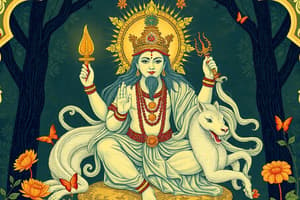Podcast
Questions and Answers
Who is considered the most famous Urdu-Hindi poet?
Who is considered the most famous Urdu-Hindi poet?
- Mirza Ghalib (correct)
- Amrita Pritam
- Mahadevi Varma
- Sarojini Naidu
Which female poet challenged patriarchal norms through her poetry?
Which female poet challenged patriarchal norms through her poetry?
- Nabaneeta Dev Sen
- Amrita Pritam (correct)
- Mahadevi Varma
- Sarojini Naidu
Who were pioneers in the use of innovative forms and subjects in Hindi poetry?
Who were pioneers in the use of innovative forms and subjects in Hindi poetry?
- Sarojini Naidu
- Mirza Ghalib
- Nabaneeta Dev Sen
- Amrita Pritam (correct)
Which poet wrote about contemporary issues and themes in Hindi poetry?
Which poet wrote about contemporary issues and themes in Hindi poetry?
What topics did female poets address in Hindi literature?
What topics did female poets address in Hindi literature?
How has Hindi poetry been described in terms of its cultural significance?
How has Hindi poetry been described in terms of its cultural significance?
Which language influenced early forms of Hindi poetry like Ghazal, Doha, and Chaupai?
Which language influenced early forms of Hindi poetry like Ghazal, Doha, and Chaupai?
What is a common theme found in verses of a ghazal?
What is a common theme found in verses of a ghazal?
Which movement significantly impacted the development of Hindi poetry, emphasizing devotion to God through simple language and music?
Which movement significantly impacted the development of Hindi poetry, emphasizing devotion to God through simple language and music?
Which poets composed verses celebrating Hindu deities and philosophical ideas using the Chaupai form?
Which poets composed verses celebrating Hindu deities and philosophical ideas using the Chaupai form?
What is the primary focus of the verses composed during the Bhakti movement by poets like Kabir, Nanak, and Surdas?
What is the primary focus of the verses composed during the Bhakti movement by poets like Kabir, Nanak, and Surdas?
Which of the following is NOT typically found in a ghazal?
Which of the following is NOT typically found in a ghazal?
Flashcards are hidden until you start studying
Study Notes
Exploring the World of Hindi Poetry
Hindi, a vibrant language and one of India's official tongues, has a rich tradition of poetry that spans over centuries. From the courtly verses of the medieval era to the socially engaged verse of the modern period, Hindi poetry has evolved, adapting to different cultural and historical contexts while retaining its unique character.
Early Influences and Forms
Hindi poetry emerged from the Indo-Aryan language, deriving its roots from Sanskrit. Early forms like Ghazal, Doha, and Chaupai were heavily influenced by Persian and Arabic poetry, reflecting the cultural exchange between the Indian subcontinent and the Middle East during the medieval period.
Chaupai is a form of a four-line verse, often used in bhakti (devotional) poetry, where poets like Kabir and Tulsidas composed verses to celebrate Hindu deities and philosophical ideas. Ghazal, a form of poetry that originated in the Middle East, became popular in Hindi literature. The verses in a ghazal are typically stanzas with a shared rhyme scheme and a refrain, often expressing themes of love and longing.
Bhakti Movement and Later Developments
The Bhakti movement, starting in the 6th century, played a significant role in the development of Hindi poetry. Composers like Kabir, Nanak, and Surdas expressed their devotion to God through simple language and music. Their works were incredibly influential in popularizing Hindi poetry among the masses.
Later, Hindi poetry grew in complexity and depth, with poets like Mirza Ghalib, Mahadevi Varma, and Amrita Pritam writing on diverse themes, such as love, society, and politics. Ghalib, arguably the most famous Urdu-Hindi poet, wrote about the complexities of human emotion, while Varma and Pritam were pioneers in the use of innovative forms and subjects.
Women's Contributions
Women have played a pivotal role in Hindi poetry, challenging the patriarchal norms of society. Female poets like Sarojini Naidu, Amrita Pritam, and Mahadevi Verma have made significant contributions to Hindi literature, addressing topics such as love, women's rights, and social issues.
Modern Hindi Poetry
Today, Hindi poetry continues to evolve, with poets exploring new forms and subjects. World-renowned poets like Nabaneeta Dev Sen, Arvind Krishna Mehrotra, and Khwaja Ahmad Abbas write about contemporary issues and themes, pushing the boundaries of Hindi poetry.
Through its long and varied history, Hindi poetry has embodied the diverse and complex cultural landscape of India. Today, Hindi poetry continues to inspire and challenge audiences, offering a window into the richness and complexity of the Indian experience.
Studying That Suits You
Use AI to generate personalized quizzes and flashcards to suit your learning preferences.




